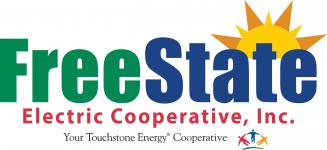Board of trustees to take action on proposed financial adjustments in October, members to see adjustment on February 2021 billing.
The time to act is now. That is what the FreeState Board of Trustees has decided after tabling any electric service charge adjustments following two years of decreased revenue.
“The board examined all possibilities,” said Jeanine Murphy, board president. “We looked at many scenarios because we wanted to hold off as long as we could because we know the pandemic and economic shutdown this spring impacted our members.”
“But, the fact of the matter is we are not able to push that back again,” Murphy added. “If we don’t act now, we’ll have to make even bigger changes later and if we are going to have to adjust, we want to make incremental adjustments to help minimize the financial impact to our members.”
The small steps will prevent having to make one significant change at a later date — a change like a costly rate case study that would impact the actual rate of kilowatt-hour sales. Instead, the board has opted to take a different route by making a small adjustment to the cooperative’s electric service charge (ESC).
The ESC is a fixed amount that provides revenue for the cooperative to cover the cost of materials like poles, wire, transformers and other infrastructure items. It also includes operation and maintenance costs.
“I do want to reiterate that this adjustment is the co-op being proactive,” said Steve Foss, CEO. “This is a necessary measure for us. Because we must maintain financial security and we need to look at all avenues to do that without raising kilowatt-hour rates, and if we can do that with small incremental adjustments to the electric service charge, then that’s what we will recommend.”
Your cooperative has kept costs consistent for years. Members have not seen any adjustment since 2010 (East District, prior LJEC) and 2012 (West District, previous Kaw Valley). For a decade there have been no changes, but neighbors powered by the investor-owned utility have seen 39 rate changes in that same amount of time.
“No changes to rates or service charges for a decade is quite an accomplishment,” Foss added. “But things are changing at a rapid rate. Costs are rising.”
One reason for that decade long consistency was the consolidation in 2017. True dollar savings paired with avoided costs put the cooperative on the right track, but revenue has been on the decline. It’s a trend that does not seem to be changing.
“There are many factors that contribute to the decreased revenue,” Foss said. “Weather is a factor, energy efficiency is a factor, and renewable options for our members have increased significantly. These are great for our members, but we have seen an overall drop in revenue and our financial forecasts are telling us we need to act now to maintain stability and to keep pushing that cost-of-service study out as far as possible.”
The proposal for the ESC adjustment comes after the Revenue Requirement Study (RRS) FreeState entered in February. Jill Taggart, finance manager, led the study to determine what exactly was needed to meet the revenue requirements from lenders and the USDA Rural Utilities Service (RUS).
The costs of a typical distribution cooperative like FreeState are put into areas identified as operation and maintenance (O&M), overhead and capital costs. There are also many factors that make up the cost structure like line density, or members per mile of line, service territory, labor costs, and the infrastructure supply chain.
The decrease in revenue and the financial forecasts are showing actions need to be taken.
“The goal is stability in a time of uncertainty,” said Foss. “Right now, we know things are uncertain, there is more unknown than known as we look at recovering from the pandemic economically.”
 “The pandemic has impacted everyone,” Foss added. “When businesses aren’t able to operate, they don’t use electricity. When schools are closed, they don’t use electricity. That all contributes to a decline in sales, and we know that hurts the bottom line.”
“The pandemic has impacted everyone,” Foss added. “When businesses aren’t able to operate, they don’t use electricity. When schools are closed, they don’t use electricity. That all contributes to a decline in sales, and we know that hurts the bottom line.”
More than 80% of the cooperative’s expenses are not controlled by the cooperative.
“We have no control over power costs,” said Foss. “And, they keep rising. Mix those costs in with the increased costs of environmental regulations, property taxes, materials, labor and transportation and it just doesn’t seem to get any easier.”
“We do know that if we want to make a significant positive impact to our revenue by making just a small adjustment to our electric service charge, we need to do it as soon as possible,” Foss said. “We want to make sure that when we make adjustments, they are small and incremental.”
The board understands there is never a right time to make adjustments, but financial stability and financial goals must be kept at the top of the list.
Foss added that instead of members bearing all the brunt of decreased revenue, staff at FreeState, along with the trustees started looking at costs and making cuts to everything unless it was a necessity to provide the standard of customer service members expect.
Electric Service Charge (ESC)
Every month a fixed charge appears on each member’s bill. The ESC provides the cooperative with a way of recovering fixed costs versus the volatile energy charge that fluctuates with weather.
One example is mild weather (much like we have been experiencing) energy sales are lower and margins are not high enough to cover fixed costs like transformers, line maintenance, taxes, interest, administrative costs, and so on — those costs are associated with keeping power available even if no electricity is used. The charge is a consistent method of recovering fixed costs. Without this flat fee, energy charges would be higher and would fluctuate rapidly.
The fixed ESC does not vary each month. Instead, it’s a cost that is evenly distributed fairly among all members. To help the cooperative ensure long-term financial stability, this cost is necessary for generating operating revenue.
“We do want members to keep in mind that we haven’t changed anything in a decade,” said Foss, who added that when the cost-of-service studies were done in 2010 and 2012 ESC amounts suggested at that time were near $40. “We aren’t even close to that suggested amount and haven’t been. We’ve managed to maintain stability even though we were well under the recommended cost.”
Foss said the consolidation in 2017 is a major factor in being able to delay any increases.
“When we consolidated we knew this was going to be something that was possible, but we also knew that consolidation paired with our staff’s willingness to conservatively operate has delayed that full-blown cost-of-service study that would be a big financial hit to our members,” Foss said.
By adjusting the ESC, FreeState will be able to delay the costly study further. This small adjustment really makes a big impact for the cooperative.
“We’re doing what we can to make certain we manage costs that we can control, and our staff has done an outstanding job to date with that task,” Foss said.
According to Foss, the primary goal of FreeState’s board and management is to provide the best member experience and service around. However, there comes a time when we must look at making adjustments to meet our financial obligations.
The adjustment will be reviewed by the board of trustees and voted on in a special meeting on Wednesday, Oct. 28. Look for more details about the plan, and the special meeting and how members can participate in making this decision in the October issue of Kansas Country Living, The Signal, this website and FreeState's social media channels.

